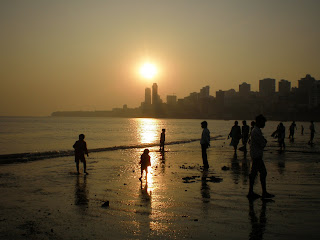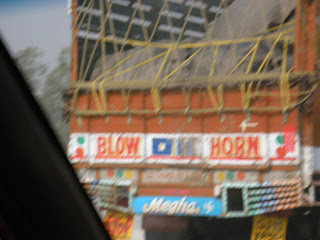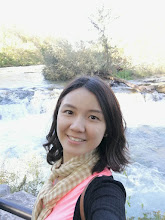With regards to the recent carnage in Mumbai and the current slew of attention by the worldwide media, and upon seeing my current physical closeness to the scene tragedy, I thought I'd give my two-cents worth.
I was visiting Mumbai three days before the shootings took place. Then, Mumbai was having another lazy, bright, hot and awfully humid Sunday. In Colaba, the tourist and most expensive district in Mumbai, thousands gathered at the magnificent Gateway of India, a famous monument built to commemorate the arrival of a British General. Thousands flocked the attraction, braving the scroching. It is at this landmark we - Dine, Sarf and I - met up with Cris, intending to spend the day in Mumbai at a leisurely pace. Being the only newbie to Mumbai among the four, Sarf decided I should do some brief touristy sightseeing. I was excited to be among the tourists, clicking away with the camera, trying to avoid Indian sellers pushing balloons and drums at us.
pace. Being the only newbie to Mumbai among the four, Sarf decided I should do some brief touristy sightseeing. I was excited to be among the tourists, clicking away with the camera, trying to avoid Indian sellers pushing balloons and drums at us.
Conveniently located right across, was the grand, glamorous Taj hotel. When it was pointed out to me by Sarf, a faint feeling of awe bobbed as my internal info storage system brought up evidence of having read somewhere, some time,

the degree of glamour, affluence and power that the Taj Hotel in Mumbai embodies. When a smartly uniformed hotel staff by the road was wiping its plastic road barricades clean when litters cover pavements on the other side of the road, you know it is India's symbol of the rich and powerful. Eagerly I waded past peddlars and honking taxis and stepped foot on the polished, shining marble steps that led to the entrance of the grand hotel.

We were greeted by security paraphernalias and guards doing their bag-checking rounds and sensoring. This is no surprise as it is common in high-end places like shopping malls, supermarkets and hotels where the rich frequents to insist on security screenings. So there we were, utilising the waiting time at the queue to take  pictures - making our presence marked at the hotel. There I was in the picture, at the plaque that would be splashed in blood and holed in bullet marks three days later.
pictures - making our presence marked at the hotel. There I was in the picture, at the plaque that would be splashed in blood and holed in bullet marks three days later.
Talk about impermance.
Indeed a porsch interior setting. Not gawkishly extravagant, but every cent invested in taste, class, elegance. I remember pausing in front of the pool and cafe, captured by the dreamlike colonial English decor - bright blue swimming pool surrounded by beautifully manicured bright pink roses that crawled upon white fences, and westerners in bathing suits in sunglasses, lying on white comfortable-looking pool benchers, basking under the sun. An idyllic scene from a film about to undertake a plot twist into the macabre - of gun-shots, shrilling screams, dead bodies splashed into the pool, tainting the blueness of the water with red - a film that will be aired on small screens worldwide. forced onto audiences' eyes.

I remember stopping by the hallway that led to haute cauture shops - LV, Fendi, Armani, gazing through a glass casing that shows a collage of black and white photographs of famous people. The VIPs that had walked into the Taj throughout the century
, distinguished rock stars, Hollywood actors and politicians, presumably so famous that captions were unnecessary.

We were there, sitting on a heavy, sturdy antique bench, relishing the ambience exuded by the beautifully varnished mahogany of the walls, at the bottom of a spiral staircase with ornate railings illuminated by soft incandescence of a table lamp. Smiling. Enveloped by the elegance of the interior, frozen and safely preserved forever in the memory card.
We dined a block away from Cafe Leopold, in another similar western cafe which name I did not get hold of, us too hungry to walk the extra steps to the famed cafe. Outside, stalls selling accessories and clothes are lined across the whole stretch of shops, enticing the westerners that walked into the cafes.

The food took a while to be served. It's Sunday, we were told, no one is expected to hurry.
Cris, me and Dine. the Sunday morn scene inside the cafe
the Sunday morn scene inside the cafeThe main charm in Colaba lies in the stretches of old heritage buildings, unrenovated, and proudly looking old and even a little shabby. A charm that could only be present with the natural workings of Time, sans the interference of humans. They watched the city change, old buildings demolished while new buildings sprout. And now, they bear sad witness to bomb blasts and attacks, of mayhem and terror happening right across the road. Their grandfatherliness unable to soothe the panic and horror unfolding before their eyes.

As night approached, we set about to CST, the famous railway station in India. The pathways that led to the entrance were occupied by makeshift stalls selling cloths and shoes, the atmosphere reminding me of night markets. Huge electronic boards in flashy marathi words direct streams of people into the multiple platforms. Sensors were situated in all entrances. It was exactly the railway scene you would expect of India - throngs of people with their luggages, some sitting idly with eyes roaming about; some lying on the floor, hoping to catch a sleep while waiting to board a train, oblivious to the endless scurrying of people all around them, in all directions, in every speed, Indians and foreigners from all walks of life. The train station simply smelled of people, flavours of innocense and insuspicion that attracted gun-wielders seeking to tear the hearts of the world to pieces and replacing them with fear and terror.

That evening we spent on the beach at Marine Drive, watching Mumbaikars with families and friends spread across the vast sandy beach like a scene from Miami Beach albeit fully clothed. Cooling sea breezes, the setting sun, the pink and purple sky, the timid roll of the waves convey a certain gentleness of nature to the people of Mumbai. The city where flashy lights of buildings and highrises spread across the horizon, the view veiled by a fog that sits, taking over the night.

Never would it expect that miles across the other side of the ocean, vengeful hearts began its sail across, forever marking here their signs of hatred.

Marine Drive
 The streams of people towards Haj Ali mosque
The streams of people towards Haj Ali mosque
 Dine and I inside the mosque, amidst crowds of devotees.
Dine and I inside the mosque, amidst crowds of devotees. 










































 boys playing by the roadside, stopping while the two odd-looking yellow skinn
boys playing by the roadside, stopping while the two odd-looking yellow skinn



